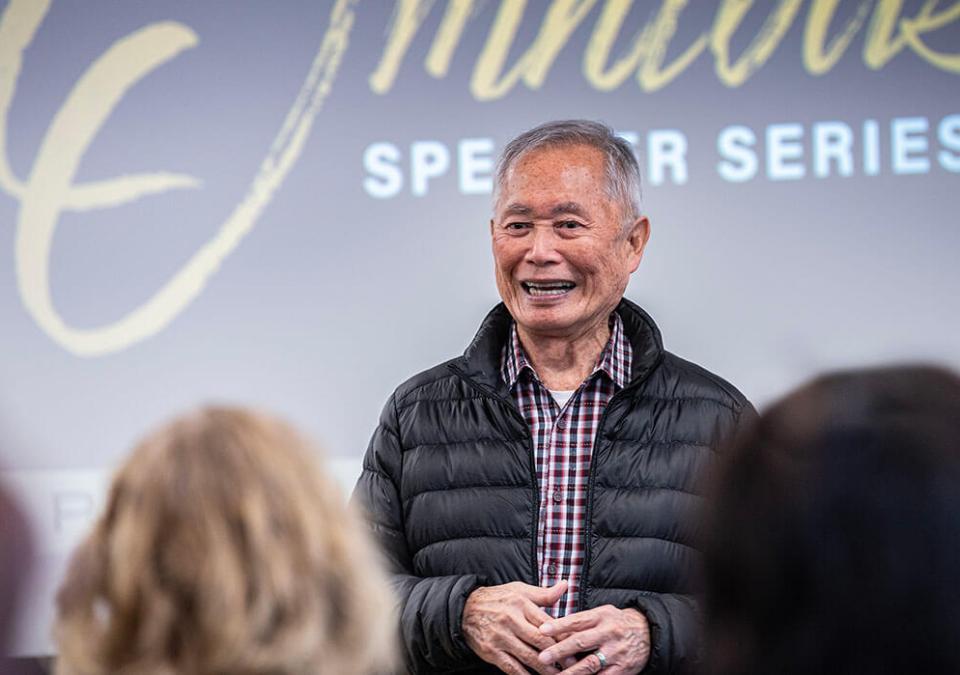
PFW Story
Omnibus finale lets Takei boldly take audience where he’s been, where we’re headed
Long-lauded as a groundbreaking actor, best-selling author, and diligent social justice advocate, George Takei became a passionate history professor Tuesday night as Purdue University Fort Wayne’s final guest in the 2022–23 Omnibus Speaker Series. The story of the challenges Takei’s family faced while incarcerated in World War II Japanese American internment camps riveted a packed auditorium, drawing a standing ovation at the end.
Twenty years after internment, Takei became a Hollywood star as the character Hikaru Sulu in the legendary TV show “Star Trek,” highlighting his long-lasting and prominent acting career. He became a vibrant social activist, including his passionate fight for LGBTQ+ rights and marriage equality in America. Though married in 2008, Takei and his husband Brad have been together for 37 years.
Announcing this was his first visit to Fort Wayne, Takei greeted his audience with Star Trek’s Vulcan sign, saying after celebrating his 86th birthday last week that indeed he has “lived long and prospered.”
Starting a five-city tour of American college campuses, Takei shared a fascinating story. Though American citizens, Takei’s family and fellow Japanese Americans were ostracized shortly after World War II started and remained in the camps throughout the war.
Reaching to his memories as a 5-year-old, Takei provided meticulous emotion and striking details about how his family was removed from their home by United States Army personnel and moved into a hastily set up detention camp at Santa Anita Park racetrack in Arcadia, California. Each family was permitted one horse stall to sleep in, and Takei recalled the pungent stink, constantly buzzing flies, and the dismay his parents felt.
Four months later, they were shoved on a three-day train ride to Rohwer, Arkansas, where they arrived to barbed-wire fences and rows of black tar-papered barracks. When Takei’s parents refused to answer a deceptively worded loyalty questionnaire, they were categorized as disloyal and the family was transferred to the Tule Lake facility in northern California, the most notorious of the 10 internment camps.
After the war, the family needed years to recover financially and emotionally, and as a teenager, Takei started asking his father questions.
“He shared with me his anguish and his rage … of being unjustly imprisoned, but he also told me about America and democracy and the American dream,” Takei recalled. “He told me that the ideals of America are shining ideals such as free speech, equal justice under the law, the right to vote, and to choose our representatives.
“He always liked to quote Lincoln’s Gettysburg Address and say ours is a government of the people by the people and for the people—and the people have to make those shining ideals true and real and strong. When the people get goaded into hysteria, they do hysterical things, and that’s what happened to us during the war.”
Takei spoke before a congressional hearing in 1971 as one of 700 Japanese Americans who had been interned.
“I have come to understand that as noble and as precious as our American ideals are, they can also be very fragile,” Takei told the committee. “Democracy can only be as good or as strong or as true as the people who make it so. It is my belief that America today is as strong enough and confident enough to recognize a grievous failure. I believe it is honest enough to acknowledge that damage was done, and I would like to think that it is honorable enough to provide proper restitution for the injury that was done.
“For in a larger sense, injury was done to those very ideals that we hold as fundamental to our American system. We, all of us as Americans, must strive to redeem those precepts that faltered years ago when I was a boy. And in that role as an American, I urge restitution for the incarceration. That restitution would at the same time be a bold move to strengthen the integrity of America.”
President Ronald Reagan apologized on behalf of the nation in 1988—nine years after Takei’s father died—and each survivor was awarded $20,000.
While speaking to PFW Honors Program students earlier in the day, Takei compared Star Trek’s ideals to the challenges of today’s society, urging the students to keep fighting for positive change. Takei said he has seen remarkable progress from the turbulence of the 1960s.
“There are many issues that can be helped, but we have to live and work in our times to make a better world,” Takei said. “We are the ones to make it happen, all of us in concert as engaged American citizens. It’s the context of the time that makes it possible for a person to make change, even something you might now think is impossible.”
The Omnibus Speaker Series at Purdue Fort Wayne is made possible in part due to the support of the English-Bonter-Mitchell Foundation, which has sponsored every season since the series launched in 1995.




